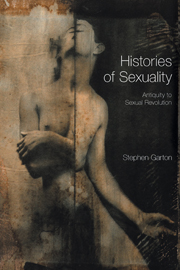Book contents
- Frontmatter
- Dedication
- Contents
- Preface
- 1 Writing Sexual History
- 2 Rule of the Phallus
- 3 Sexual Austerity
- 4 Christian Friendships
- 5 Making Heterosexuality
- 6 Victorianism
- 7 Dominance and Desire
- 8 Feminism and Friendship
- 9 Imagining Perversion
- 10 Normalizing Sexuality
- 11 Sexual Revolution
- Epilogue
- Endnotes
- Select Bibliography
- Index
5 - Making Heterosexuality
- Frontmatter
- Dedication
- Contents
- Preface
- 1 Writing Sexual History
- 2 Rule of the Phallus
- 3 Sexual Austerity
- 4 Christian Friendships
- 5 Making Heterosexuality
- 6 Victorianism
- 7 Dominance and Desire
- 8 Feminism and Friendship
- 9 Imagining Perversion
- 10 Normalizing Sexuality
- 11 Sexual Revolution
- Epilogue
- Endnotes
- Select Bibliography
- Index
Summary
The eighteenth century carries large burdens. Phrases such as age of revolutions, Enlightenment, industrial revolution, end of the Ancien Régime, birth of the asylum and rise of Romanticism have been widely used to capture the momentous social and cultural changes taking place in eighteenth-century Europe and America. More recently, historians such as Richard Godbeer, Edward Shorter and Randolph Trumbach have added sexual revolution and gender revolution to the panoply of transformations that marked the transition from early- to late-modern Europe and America. The eighteenth century, however, was in many respects the culmination of transformations stretching back much further. How far is in dispute. English historians often talk of the ‘long eighteenth century’, to signify the years from the 1680s to the 1810s. But for some historians the changes associated with the gender revolution are found from the sixteenth century, when the emergence of subversive urban subcultures, rising literacy and cheap books created the context for a dramatic increase in the production and distribution of pornography, satire and radical political tracts. Other historians, such as Guido Ruggerio and Alan MacFarlane, trace significant elements of the revolution back to the thirteenth century and even earlier.
One of the defining events of the early-modern period is the Protestant Reformation of the sixteenth and seventeenth centuries. Protestants rejected many of the key doctrines of the medieval Church, such as the importance of good works, the authority of the papacy and the significance of tradition.
- Type
- Chapter
- Information
- Histories of SexualityAntiquity to Sexual Revolution, pp. 81 - 100Publisher: Acumen PublishingPrint publication year: 2004



